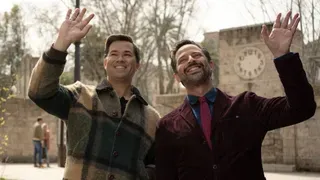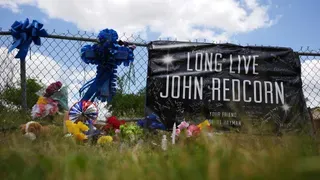February 8, 2014
Club Night Connects Poz Men
Kilian Melloy READ TIME: 4 MIN.
Men cradled drinks and chatted in small enclaves near the luminescent bar while a gogo dancer's neon green underwear was fed dollar bills. A club owner and a bartender slung drinks. A DJ enthusiastically spun house dance music as a group of men shook to the tempo under the dance floor's illuminated dome.
To outsiders, it may have seemed positively typical. But to the club goers, the party was an act of resilience and redemption from the social isolation and depression that can accompany testing positive for HIV. January 11 was the first of several HIV-positive club nights called Resilient, by and for HIV positive men and allies-the only one of its kind in San Francisco.
Drinks poured throughout the night as couples huddled in booths. A shirtless man energetically bounced around the dance floor as a man in a cowboy hat slung his moves across the slick floor. Strangers chatted near the bar. And attendees regarded these typical exchanges as redemptive and affirmative, and sometimes seldom seen by HIV-positive men.
"When I moved here I wanted to be around HIV-positive men, but I didn't have many friends. I went into depression. I socially isolated myself," said Chad Morris, a 42-year-old software engineer who organized the evening. He was diagnosed with HIV in 1999 when he lived in Seattle.
He eventually found solace in volunteering for Magnet as a desk person. There, he learned about events for the HIV-positive community, like Club Life, which Morris said brought some 150 people out for its parties at the now-defunct Club Eight in SoMA back in 2006. That party, which was organized by Stop AIDS Project's Positive Force program, was short-lived.
Morris suggested that the fundraising and interventional elements at that party contributed to its end.
DJ Paul Goodyear spins house and disco dance music. photo: Peter Hernandez
"We don't need an affiliated organization to have a party. We can make it what we want it to be, and if you're socially isolated, paying to get in isn't going to break you out," Morris said.
Resilient didn't have an air of fundraising or intervention. It was low-key and intimate, with no HIV literature to be seen, except for in the bathroom, where a poster for Positive Force was posted next to a poster for Resilient.
At the peak of the evening, some 30 men came through the club, while veteran DJ Paul Goodyear spun his signature house and disco music. Some men said they didn't go out often. Others worked for HIV/AIDS service organizations and came to support the party.
Last year, research by Case Western Reserve University showed that people under 50 living with HIV suffered from greater levels of stress and isolation than the older generation living with HIV. Stigma and a lack of empathy from those not living with HIV were cited as possible causes.
The median age at the event appeared to be 40. Connection and conversation seemed sparse, as most people were paired as couples or dancing on their own on the dance floor. Respondents to Morris's questionnaire, however, wanted just that-dancing, a DJ and a gogo boy.
The party was effectually sero-sorting men who are HIV-positive, while contextualizing HIV disclosure.
"I didn't feel reluctant to share my status because it's part of the party. It's not a difficult thing for me to talk about," said Manuel Vasquez, a treatment advocacy coordinator at Positive Force.
A man dances underneath Club OMG's illuminated dome, which was designed and fabricated specifically for the club. photo: Peter Hernandez
Being in an environment where HIV-positivity was the premise for the party may have destigmatized disclosure. But that feeling, Morris said, needs to be more widespread among all LGBT club culture.
"Here, stigma isn't so bad. But in the club, it's still a problem when disclosing that someone's HIV-positive," Morris said.
He added that there is an abundance of ignorance in the HIV-negative community about the risks of being infected by HIV someone who is undetectable, and that lends isolation and depression to many people living with HIV.
"Lots of negative people aren't educated about HIV or about being a positive person," Vasquez said. Events like Resilient, he said, are important to validate positive people who don't feel a sense of community, and that men in the gay community are not familiar with the HIV-positive life experience and often shun them.
Vasquez attended the party for two hours and said he met five or six people, and felt that the party was a great way to discover camaraderie.
Morris said that everyone he talked to said they had a good time and that he is expecting twice the size of a crowd next month.
"There's a lot of positive energy about the event," he added.
Resilient occurs once every second Sunday of the month at Club OMG, 43 Sixth St., at from 5pm to 9pm. February's DJ is Matt Consola and March's DJ is Sergio Fedasz. www.clubomgsf.com
Kilian Melloy serves as EDGE Media Network's Associate Arts Editor and Staff Contributor. His professional memberships include the National Lesbian & Gay Journalists Association, the Boston Online Film Critics Association, The Gay and Lesbian Entertainment Critics Association, and the Boston Theater Critics Association's Elliot Norton Awards Committee.







